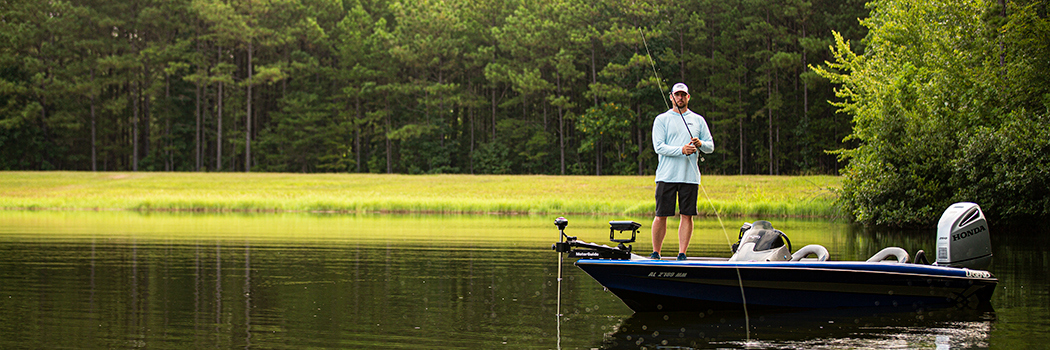By : Mark Hicks
One of the most joyful moments for shore-bound anglers is the day they buy their first boat. It opens the door to a wonderful world of fishing independence. No longer must you depend on someone who has a boat to take you out on the water. Now you can do so whenever you have free time.

If you’re on the verge of purchasing your first boat, consider some advice from South Carolina bass pro Brian Latimer.
“This is common sense, but get something you can afford,” Latimer said. “If you’re struggling to make payments on your dream boat you won’t have enough gas money to go fishing as much as you’d like to.”
Latimer also stressed that the weight of the boat and trailer should not exceed the towing capacity of your tow vehicle.
Storage is another consideration. Do you have a garage or some type of shelter where you can park the boat? If not, Latimer recommends purchasing an aluminum boat that will hold up better to the weather and UV rays. A quality boat cover may protect the deck and interior of a boat stored outside, but it does little to shield the trailer and the sides of the boat.
“An aluminum boat is a good choice for someone who doesn’t have OCD and would rather go fishing than clean their boat,” Latimer said. “You can do everything in an aluminum boat that you can in a glass boat.”
Whatever type of boat you buy or have bought, be sure you have all federally required safety items aboard. If you fish the Great Lakes in a boat longer than 16 feet, you must carry flares or other Coast Guard approved visual distress signals.
“You need some way of starting the outboard if the battery goes dead,” Latimer said. “Jumper cables let you connect to a trolling motor battery. I have Power-Pole’s Charge system. It does that automatically. Another option is a battery starter pack.”
There are a number of maintenance tasks you must do to avoid breakdowns. High on the list is treating your boat fuel with additives that offset the ill effects of ethanol, which is especially damaging to two-stroke outboards.
Regularly check the propeller on your outboard and electric trolling motor. Fishing line under a prop can wear the seal and cause water to enter, resulting in a costly failure.
If the outboard’s lower unit hits something while you are running, spin the prop after pulling the boat from the water. If the prop wobbles, even slightly, the shaft is bent. Get it fixed immediately as this will surely damage the lower unit.
Have the prop repaired if any of the blades have been bent. A bent blade or blades impede the boat’s performance and cause vibrations that could damage your lower unit. Carrying a spare prop will prevent you from being stranded in the event of a total prop disaster.
Change the lower unit’s gear oil at least once a year. Latimer also checks the gear oil regularly for water.
“I remove the bottom drain screw and let a little gear oil leak out,” he said. “White oil tells me water has gotten into the lower unit and that I have to drain it and fill it with fresh oil.”
Transom and jackplate bolts can loosen, especially after rough-water boat rides. Put a wrench on the nuts and bolts often to ensure they are tight.
Latimer worked in landscaping prior to becoming a professional bass angler, which required towing a trailer with machinery to worksites. He knows from long experience the many pitfalls that can disable a trailer.
“Trailer problems can be a nightmare,” Latimer said. “Fresh tires that are properly inflated will last for years. Replace any tire that has cracks in the sidewall, even if it has plenty of tread. That’s especially important if you have a single axel trailer.”
Because boat trailer hubs are frequently submerged, bearing protectors are necessary to prevent water from entering the hub. Latimer pointed out that you should routinely look behind the tire to see if it is splattered with grease. If so, you must replace the seal in the back of the hub and have the bearings repacked with grease.
Some type of device is needed to support the lower unit while towing your boat. It will prevent damage to the transom and to the hydraulic steering and trim systems, Latimer pointed out. The “kick stands” on the outboard are insufficient for this task.
Every trailer must have transom hold-downs to make certain the boat stays rock solid on its bunks while towing. Before you pull out of a launch area after loading your boat, always do a final walk around. Check to be sure the trailer’s bow strap and transom hold-downs are securely fastened and that the lower unit support is in place.
This is also a good time to check your trailer’s lights. If they are not working properly, the problem may be as simple as a poor ground wire or a fuse in your tow vehicle. Whatever the issue proves to be, it must be fixed before your next outing.
Finally, if you live where cold winters prevent you from getting on the water for months, always have your outboard winterized and the boat’s gas treated with some type of fuel additive. Ideally, you should drain the boat gas and add fresh fuel to start the season.